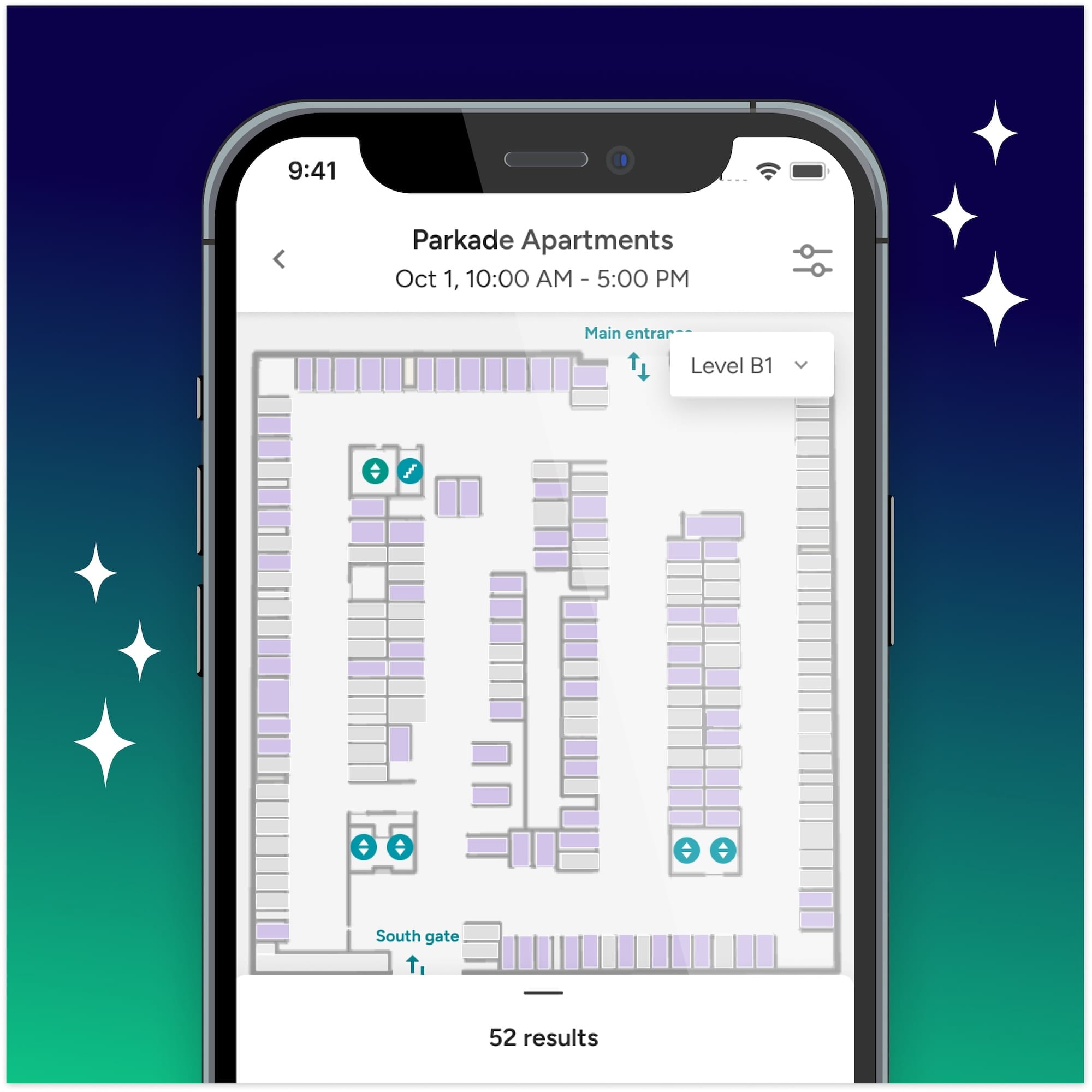

TABLE OF CONTENTS
Many multifamily properties are moving away from free or bundled parking. In some states, like California, unbundled parking will be mandated by law in 2025. But even in areas where these requirements don’t exist, many property managers and owners are realizing how expensive free parking truly is, with the costs naturally rolling into rent prices and making it hard to compete with nearby properties.
That being said, while making the decision to charge can be easy, deciding how much to charge isn’t always simple. Many decision makers opt for uniform pricing, but unless your lot or garage has more or less identical spots, there are major downsides to this approach.
If you have any variety in the types of spots you have to offer, your pricing should reflect that. Pricing spots based on desirability can lead to many benefits both for your property team and your residents.
Many apartments deal with a shortage of off-street parking spots, but the interesting thing is that many of these properties are just a spot or two short. That means that the solution to this problem often lies in operational changes, versus having to build out new spots.
When every spot is priced the same, or is offered for free, it can lead to residents grabbing up more spots than they need. The right pricing can help balance out your supply with demand, helping to clear up a few spots to eliminate shortages, without letting too many spots sit empty.
When you put a premium price on premium spots, you’re able to boost your parking revenue.
We’ve had customers make several thousand extra dollars per month by being more intentional about their parking pricing strategy.
When you generate these extra streams of income, you’re able to be more flexible on your rent prices. If all else is equal with your competitors, a slightly lower base rent can give you the extra edge to nudge new residents your way.
This is perhaps the most important benefit. Some residents may care most about having the best spot possible, or having access to certain parking amenities. Some other residents may just want to keep costs as low as possible.
A more dynamic pricing strategy that reflects the desirability of the spot in the price can satisfy this full range of needs, leading to happier residents, better reviews, and fewer complaints.
Often, your parking lot or garage isn’t going to have all identical spots. From spot to spot, several factors could vary that may impact the price that a resident is willing to pay for it.
Here are the most common factors that you should take into consideration when pricing your spots.
If you have a large apartment complex with a sprawling parking lot, you may have some spots that require a longer trek to get to the units. This is one of the simplest ways to vary the price of parking spots.
You can create different “zones” of parking, with the cheapest being the furthest away from the units and the most expensive spots right up front.
This applies to parking garages as well as parking lots. If you have a garage with a whole level that requires more steps or an elevator to get to apartment units, or some areas of spots require a long walk to get to the stairs or elevators, these are great opportunities to offer a lower price.
EV chargers are considered the “hot new rental amenity” as electric car ownership is on the rise. Given that there are currently 2.5 million EVs in the U.S. and over a third of adults are considering an EV for their next car, the need for chargers in apartments is skyrocketing.
The network of public chargers is not a viable option for many EV owners. On top of the inconvenience if you don’t live within walking distance of level 2 chargers (leaving you to try to kill time for hours while your car charges), many chargers aren’t extremely unreliable. Wall Street Journal tested this recently in LA, and of the 100 stations they visited, over 40 of them were non-functioning.
So as EV cars become more commonplace, these problems with public chargers are only going to get worse and there will be an increased demand for on-site EV chargers in your community. And people will increasingly be willing to pay good money for the convenience of charging at home.
This is also a good opportunity to offer different levels of charging for different prices. For example, spots with quick chargers can be the most expensive, level two chargers are a little cheaper, and a spot with an outlet to plug in level 1 chargers are the cheapest, just a small step up from a non-EV spot.
Sometimes, tandem parking is necessary to make due with limited parking spots, but these spots come with some pretty significant logistical complications. They become especially tricky to handle when non-roommates need to coordinate sharing the spot.
With uniform pricing, these spots are going to either be left sitting empty, or you’re going to have some angry residents if they’re stuck with this spot while paying the same price as everyone else.
If these spots are necessary, try to make the most of them by giving especially budget-conscious people the opportunity to get a great price on a parking spot. If someone doesn’t use their car much, they may be excited about the prospect of saving some money even if they have to deal with the occasional inconvenience.
The amount of room someone has to park – whether it’s the size of the spot itself or if it has a car to one or both sides of them – can be a major consideration for residents as they park.
For example, say that someone has a large car that can’t fit in a compact spot, or they have a luxury car that they are scared to damage. These residents may be more likely to pay for an extra-large spot, or for a spot that has no neighbors.
Then on the other hand, you have people with compact cars like Smart Cars or Fiats that have no problem fitting in even the tightest spots. They may jump at the opportunity to take some spots that other cars may have trouble navigating (so they may otherwise sit empty) to save a little money per month.
Covered parking is a coveted amenity, especially in locations where there are periods of extreme cold or heat. Many people prefer covered parking for their own comfort (i.e. not having to lug groceries in when it’s raining) or to prevent damage to their car by extreme rain, sun, snow, or hail.
If part of your parking spots are open, while others are covered, either by a car port or fully enclosed in a garage, you can raise or lower prices to meet the demand of the covered spots.
While pricing based on desirability is one key component of the most effective pricing strategy for your parking lot or garage, it’s not the only factor..
You also have to consider:
For a deeper dive into all of these different considerations, check out our in-depth blog post about how to price parking.
While developing and implementing a pricing strategy can seem daunting and time-consuming, the right parking management system will make it simple. Parkade offers easy dynamic pricing, helping you charge the right price every time.
.jpg)
As parking management becomes increasingly digital, security becomes critical — and we’re excited to share that we've achieved a major security milestone.
Read Story
We’re thrilled to announce one of our most significant leaps forward this year: the launch of dynamic maps across our mobile and web applications.
Read Story
Now that AB 1317 is official, it’s time to brush up on the requirements and see how your properties stand to benefit.
Read Story